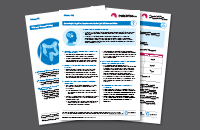 Full Guidelines
Full Guidelines
Click here to view article

 Tools
Tools


 Additional Documents
Additional Documents
Click here to see additional documents

 Endorsements
Endorsements
This Clinical Practice Guideline has been endorsed by the Nurse Practitioners’ Association of Canada (NPAC).

 Calculate by QxMD
Calculate by QxMD
This guideline and KT tool(s) are available on QxMD. Click here to download the app.
Summary of recommendations for clinicians and policy-makers
Recommendations were based on the overall balance between possible benefits and harms of preventive and treatment interventions, weighing the potential benefits against any harms.
Pooled analyses from four population-based randomized controlled trials (RCTs) with men 65 to 80 years of age indicate that one-time screening for Abdominal Aortic Aneurysm (AAA) with ultrasound reduces the risk of AAA-related mortality, rupture and emergency repair. On the other hand, screening can also lead to identification of AAAs that would never rupture and increases the number of elective repairs which are conducted. The prevalence of AAA in screened populations has declined since these RCTs were conducted, which would reduce the absolute benefit of screening from that reported in the trials.
Despite evidence showing increased risk of AAA among smokers, the Canadian Task Force on Preventive Health Care did not make a separate recommendation on screening this population because there is no evidence on outcomes of screening smokers for AAA.
The Task Force will continue to carefully monitor scientific developments in screening for AAA which may impact on these recommendations.
Recommendations
- We recommend one-time screening with ultrasound for abdominal aortic aneurysm for men aged 65 to 80.
(Weak recommendation; moderate quality of evidence) - We recommend not screening men older than 80 years of age for abdominal aortic aneurysm.
(Weak recommendation; low quality of evidence) - We recommend not screening women for abdominal aortic aneurysm.
(Strong recommendation; very low quality of evidence)
A weak recommendation in favour of screening men from 65 to 80 years of age for AAA underscores the importance of the primary care provider and patient discussing patient preferences for screening. For men over 80 years of age the potential benefit of screening is reduced because they are more likely to experience medical conditions that increase their risk of adverse events from elective procedures to repair an AAA. A weak recommendation against screening suggests primary care providers discuss patient preferences around screening with healthy men over 80 years of age for whom an elective procedure to repair an AAA would pose less risk. Women have very low rates of AAA and greater risk of mortality following an AAA procedure which reduces the likelihood of benefit from screening. The recommendation against screening is strong as risk of developing an AAA is much lower for women and, given the likely lack of benefit, AAA screening would consume resources that could otherwise be used for interventions with demonstrated effectiveness.
Additional Documents
- Clinician Summary
- Systematic Review Protocol(pdf)
- Systematic Review (pdf)
- Published Systematic Review (JVS)
- Published Systematic Review (PREVENTION+)
- List of Excluded Studies (pdf)
- Patient Preferences Data Summary (pdf)
- Evidence Tables for Men Over 80 Years of Age and Women (pdf)
- Outcomes for Harms of AAA Screening for Men 65 to 70 Years of Age (pdf)
- Updated Evidence Table for Men 65 to 80 Years of Age (pdf)
- CMAJ Author Podcast
ECRI Evaluation Scores
ECRI Guidelines Trust scores guidelines based on their adherence to the National Academy of Medicine Standards for Trustworthy Guidelines. Find the ECRI evaluation scores for this guideline here.




